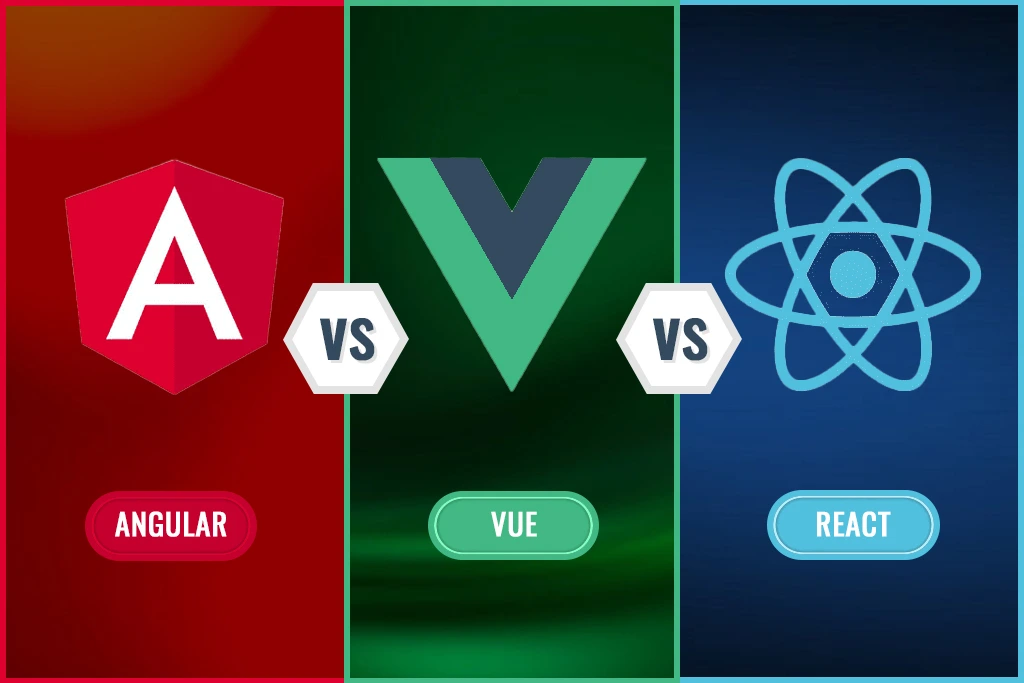When building modern web applications, choosing the right front-end framework is crucial.
Table Of Content
- Introduction
- Confused Between React, Vue & Angular? Start Here
- Quick Comparison Table
- React: Component-Based and Flexible
- Best Use Cases
- Vue 3: The Most Beginner-Friendly
- Pros
- Cons
- Best Use Cases
- Angular: Full-Fledged Enterprise Framework
- Pros
- Cons
- Best Use Cases
- So, Which One Should You Choose in 2025?
- 🔹 Choose React if
- 🔹 Choose Vue if
- 🔹 Choose Angular if
- Job Market & Community in 2025
- ✅ Final Thoughts
Introduction
When building modern web applications, choosing the right front-end framework is crucial. In 2025, the three giants—React, Vue, and Angular—continue to dominate the developer landscape. But which one should you pick for your next project?
Each framework has its own strengths, weaknesses, and ideal use cases. This guide will help you compare React vs Vue vs Angular across performance, learning curve, scalability, community, and use cases so you can make a confident, informed choice.
Confused Between React, Vue & Angular? Start Here
Quick Comparison Table
| Feature | React | Vue 3 | Angular |
|---|---|---|---|
| Type | Library | Framework | Full Framework |
| Maintained By | Meta (Facebook) | Evan You & Team | |
| Language Support | JavaScript/TS | JavaScript/TS | TypeScript |
| Learning Curve | Moderate | Easy | Steep |
| DOM Usage | Virtual DOM | Virtual DOM | Real DOM |
| Performance | Excellent | Excellent | Good |
| Community Size | Largest | Growing Fast | Strong |
| Best For | SPAs, UIs | SPAs, lightweight apps | Enterprise-level apps |
| Ecosystem | Flexible | Lightweight | Complete |
React: Component-Based and Flexible
- Huge community and ecosystem
- Reusable components
- Great performance with Virtual DOM
- Massive library support (Redux, Next.js, etc.)
- JSX for templating
- Just a library – you have to choose routing, state management, etc.
- JSX can be confusing for some
Best Use Cases:
- Large-scale apps with dynamic UIs
- Projects requiring high customization
- When you need flexibility and community support
Vue 3: The Most Beginner-Friendly
Pros:
- Simple syntax and learning curve
- Composition API for advanced logic
- Reactive data binding
- Great documentation
- Small bundle size
Cons:
- Smaller community (though growing)
- Limited job market compared to React
Best Use Cases:
- MVPs and lightweight SPAs
- Projects with tight deadlines
- Beginners and solo developers
Angular: Full-Fledged Enterprise Framework
Pros:
- All-in-one: routing, forms, testing, HTTP
- Scalable architecture
- Strong TypeScript support
- Backed by Google
- Built-in tools for enterprise-grade development
Cons:
- Steep learning curve
- Heavier bundle size
- Verbose and complex syntax
Best Use Cases:
- Enterprise applications
- Large teams and long-term projects
- Structured app development with strict guidelines
So, Which One Should You Choose in 2025?
🔹 Choose React if:
- You need flexibility and rich ecosystem
- You’re working on complex, interactive UIs
- Your team already knows React
🔹 Choose Vue if:
- You’re a beginner or working solo
- You want quick development with simplicity
- You’re building an app with minimal overhead
🔹 Choose Angular if:
- You’re building an enterprise-level application
- You prefer structure and out-of-the-box features
- You have a large team familiar with TypeScript
Job Market & Community in 2025
React continues to dominate job listings and StackOverflow discussions.
Vue is growing fast in Asia and among indie developers/startups.
Angular remains strong in government, banking, and enterprise sectors.
✅ Final Thoughts
There’s no one-size-fits-all answer. The right framework depends on your team size, project complexity, timeline, and scalability needs.
🚀 2025 Tip: All three are great. Don’t choose based on trends—choose based on what fits your project goals and development team.









No Comment! Be the first one.